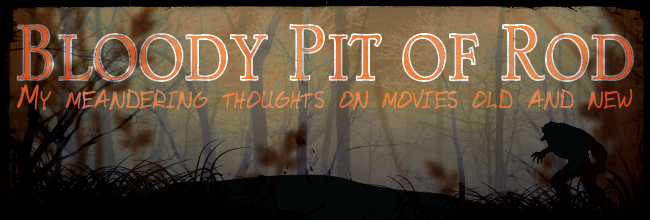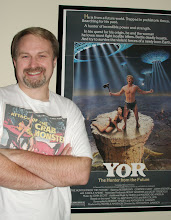House of Whipcord begins on a rainy dark night
somewhere in the English countryside. A beautiful but obviously distressed
young woman is stumbling along a roadway. She almost collides with a parked
truck and when the driver helps her inside he discovers that the poor girl has
been beaten terribly with a whip. As the good Samaritan sets off to find a
hospital the film flashes backwards in time to show us how this woman has come
to be in this awful state.
We find French émigré Ann-Marie (Penny Irving) at a
trendy art scene party in London
where she is a minor celebrity because of her recent arrest for public nudity.
Although the public indecency was done as part of a modeling job she is a
little ashamed of what happened and even the lauds of her friends can't cheer
her up. Lurking at the party is Marc (Robert Tayman), a handsome young man who
takes her mind off her troubles and asks her out on a dinner date. At dinner
Marc is charming but also demonstrates a hidden dark side when he frightens
Ann-Marie with a closed-eyes game of tactile distress. This should have warned
the lonely girl off but she seems to need some kind of relationship and so
dismisses the incident. When Marc declines her offer of spending the night at
her place she is surprised when he instead asks her to join him the next
weekend to meet his mother in the country. Ann-Marie's roommate and fellow
model Julia (Ann Michelle) is concerned about her friend but wishes her well on
her trip. Julia has her own problems and is preoccupied by her married
boyfriend's insistence on delaying leaving his wife.
The trip to Marc's mum's home is a good deal longer
than Ann-Marie had anticipated, and when they finally arrive she's ushered into
the gated and locked compound of an old jail. Immediately the girl is divested
of her clothes, her luggage and her dignity as she is brought before an elderly
blind judge. She's informed that she has been found guilty of flouting public
decency for her public nude display. The judge explains that they have set up
this private house of corrections for the public good. Their goal is to hold
people responsible for crimes that the permissive English courts punish too
laxly. Strict moral uprightness is their objective and the only solace offered
in this prison is a Bible placed in each small cell. The newest convict has the
situation explained by her cellmate, another girl imprisoned on moral charges.
The jail is looked after by only three older women; there are five other
inmates and discipline is harsh. First offense merits a stay in solitary, the
second infraction results in a beating with the titular whipcord, and strike
three... you're out. Execution by hanging is the ultimate penalty and one that
every single inmate has somehow met so far. The place is run by Mrs. Whitehurst
(Barbara Markham), an obviously insane woman obsessed with morality and
tormented by her past. She blames all her life's failures on the loss of her position
as governess of a real prison years before — a loss having to do with
the death of a female French inmate much like Ann-Marie.
While only two other women are employed as jailers, their
care in dealing with the prisoners has made escape impossible. They seem just
as deluded as Mrs. Whitehurst if not as mad, and at least one (Sheila Keith)
appears to be a lesbian with a streak of sadistic self-hatred. Sadism turns out
to be the rule of the place as we learn that Marc is Whitehurst's illegitimate
son whose sadistic tendencies are encouraged by dear old mum. Not only is Marc
used to lure wicked ladies to the trap but also once mother fixates on
Ann-Marie he entices her to make an escape attempt. This leads to her quickly
making strikes one and two with little hope of ever seeing the outside world
again.
This is a surprisingly good film. Its low budget never
interferes with the story and even manages to add a sense of malice to the
proceeding at times. This is a fine example of meager means used effectively to
make a solid movie. House of Whipcord sets itself up with a wink at
the audience when it opens with a text passage decrying the fallen moral state
of modern society. Anyone that thinks this is to be taken literally will be
sorely and amusingly disappointed. The film is an attack on the simpleminded
moralism of those who would wish to impose their views on society with poor
Ann-Marie as an example of the folly of putting religious judgments into law.
Ann-Marie is clearly a naive young girl searching for comfort and trying to
find her way when she is abducted and tortured. She feels embarrassed by her
actions and is a far cry from the kind of evil creature of lust that the
self-appointed court is set up to punish. Of course, the fact that this system
only seeks to punish women is the classic form of condemnation strait out of
the Old Testament Bible. Remember, it was always the women who were stoned to
death for adultery, not the men. This Biblical view of forcing women to act as
scapegoats for all sin shows up in Whipcord starkly as the moralists
don't even consider going after the male photographer who took the nude photos.
Punishing men is never even considered by the jailers, as if Eve were the only
sinner and her punishment the only concern. The system set up by this small
coven of moralistic outlaws is, sadly, exactly the kind of religiously
intolerant thing I see calls for every other week to this day. That director
Pete Walker and his writers were seeing this type of moronic hypocrisy in
swinging London is not as shocking to me as it
is to notice that we are currently in another up cycle of the same thing now in
America .
With this kind of dark story is a downbeat ending any surprise?
I've only seen a few of director Walker's films but
I've been surprised by their high quality. Especially here, he shows not only
an eye for interesting ideas but a strong visual flair too. His shot
composition is often clever and the film is very well edited with a remarkably
fine story flow. In the last half-hour of the film Ann-Marie's roommate Julia
begins a search for her and the juggling of these two narratives is handled
brilliantly. The film never feels rushed but it moves very well. This is
journeyman craftsmanship on display in a way that makes many more recent horror
films look both poorly conceived and sloppy. I look forward to working my way
through Pete Walker's films in the future.













3 comments:
Which other Pete Walker movies has you seen?
I've only seen three others - Die Screaming Marianne (OK, but nothing I'd revisit), Schizo (which I can't remember very well) and HOme Before Midnight (fascinating).
I've seen House of Whipcord, Schizo, and The Comeback. I liked them in that order too.
Post a Comment